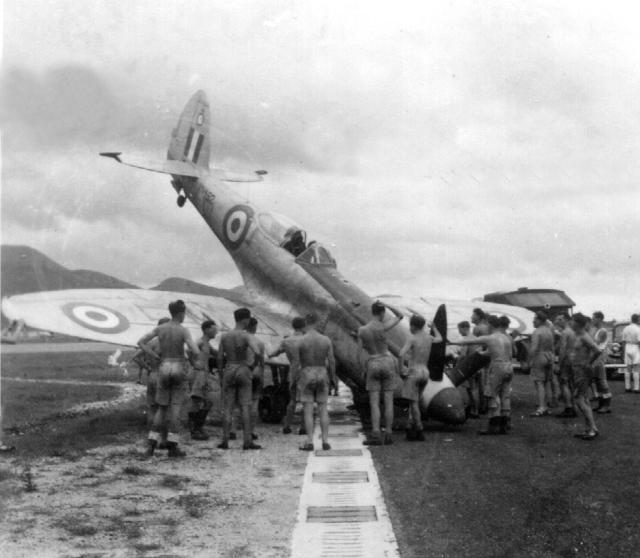This must have caused quite some amusement but not for the unhappy pilot waiting to be got out of his cockpit! Thanks to Moddsey and others for correcting the details, now updated. Kai Tak it is. See all the interesting comments below, and as I typed there, Spitfires appear to have had a reputation for being tricky on the ground - but great in the air!
Date picture taken
3 Oct 1953
Gallery
Shows place(s)

Comments
Re: Spitfire Accident
A photo of the landing accident to the Auxiliary Air Force Spitfire, VN492 at Sek Kong in October 1953. A photo of the tip-up can be viewed here. A write-up of the accident can be read here and here
Spitfire crash
Thanks for the correction, Moddsey. I’ve changed Jack’s location and the date. Andrew
Spitfire VN492 in Flight
On a car forum, I noted the captioned Spitfire in flight which was nice to see Quite a rarity. There are also a few other photos taken in Hong Kong
I have a problem with this
I have a problem with this. A close examination of the two photos shows that, although they are apparently the same aircraft (VN492, although I could be convinced that the b&w is VN482 also), they seem to have been taken on different occasions. The colour photo linked by Moddsey clearly shows a large HKAAF "N" on the fuselage which is not present on the photo here, and the b&w photo here has some sort of emblem (which looks like an RAF squadron or base insignia, not a HKAAF one) on the tail fin above the three-colour stripes which is not present on the colour photo. There is also a marking below the cockpit in the colour photo which is clearly absent in the b&w one.
Moreover (less conclusively since the plane could have been moved) the aircraft are in quite different positions. In the colour photo the wheels of the aircraft are on the paved runway and the nose is in the long grass. In the b&w photo here the wheels are in the (short) grass and the nose is on the paved surface. Moreover, in the colour photo I see no evidence of the white and dark runway edge markings which are clearly in the b&w photo here.
It seems to me either that VN492 ended up nose down on more than one occasion, or that in fact the b&w photo is of VN482, perhaps on arrival in HK on being transferred from RAF Seletar (this is speculation based on the fact that the HKAAF Spitfires apparently came from Seletar, and VN482 was scrapped at about the time the others were transferred).
In RAF colours
In the in-flight photo you link VN492 is in RAF colours, like the b&w photo here. The colour photo of the crash is later when it was in HKAAF colours.
Spitfire
Hi everyone. I'm afraid that I cannot add anything of use to this discussion, so I'll leave it to you more knowloedeable guys to sort it out - but I shall happily adjust the title, etc, if and when you come to an agreed conclusion. Andrew
Interesting
Very Interesting. Thank you for the comments. Silly me - had not noticed the large ‘N’ with the coloured photo. Agreed that the nose-down had occurred on different occasions.
Hi everyone.
Hi everyone.
Jack, who took the photograph definitely had the up-ended Spitfire photograph labelled as at Kai Tak. It's difficult to tell from the restricted view of the mountains in the background but when he took the photograph in 1951-3 there would not have been so many R.A.F. personnel at Sek Kong. It's much more likely to have been at the main base of Kai Tak. If you agree, I think I'll change the title back to Kai Tak. Andrew
Original details
I didn't see the original details before they were edited. In particular, did Jack have a date for the photo?
Hi Paul,
Hi Paul,
Very few members of the 367 Assocxiation put dates to their photographs, but Jack was in Hong Kong between 1951 and 1953. So if Jack took the photograph, as I think he did, it must have been during that time.
Andrew
Thanks Andrew
As Kai Tak had been labelled, I suggest to revert to the original title. It would be nice to have Jack's interesting B/W photo resolved as the accident event does not appear to be covered in the print media. Will have a poke around and see if anything else tips up. Cheers!
Location
Others here are far better than me at identifying locations from hill shapes, so if no-one feels the photo is incompatible with Kai Tak then I say put it back to the original label.
Hi guys. Jack is no longer
Hi guys. Jack is no longer with us so I am not able to ask him direct. I'll switch the title back to Kai Tak in a few days unless there is any further comment. It certainly seems that the two crashes were at different times, and the 'runway/tarmac is more likely to be Kai Tak, where Jack may have spent some time - but I am pretty sure he never went to Sek Kong. Incidentally, I was once told that Spitfires were very difficult to control on the ground (no forward visibility on account of the huge engine) and were also quite prone to tipping up if not handled with care and skill. Andrew
Background Hills
Hills in the background at Kai Tak and post war runway. The high, flat topped hill at the extreme left in the B/W photo looks like the hill at mid-right below.
Hi Moddsey,
Hi Moddsey,
Thanks for the 1956 colour photograph. I agree that everything now points to Jack's photograph being of Kai Tak, as he had labelled it. I'll change the title now. Andrew